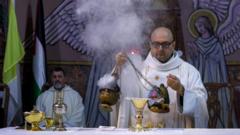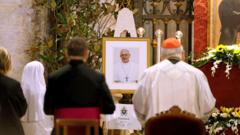As the world prepares for Pope Francis’ funeral, his legacy continues to resonate deeply. His final arrangements signify a break from tradition as nations mourn the impact he had on millions, particularly his advocacy for social justice and compassion for marginalized communities.
Farewell to Pope Francis: A Legacy of Simplicity and Social Justice

Farewell to Pope Francis: A Legacy of Simplicity and Social Justice
The Vatican announces a simplified funeral for Pope Francis, reflecting his life of humility and engagement with pressing social issues. A global outpouring of grief accompanies preparations for a new leader of the Catholic Church.
Pope Francis’ funeral will take place on Saturday, marking a moment of both reflection and transition for the Roman Catholic Church. In a departure from traditional grandeur, the ceremony is anticipated to resonate with the pope's established ethos of simplicity—a hallmark of his pioneering papacy. Cardinal Giovanni Battista Re, the dean of the College of Cardinals, is set to lead the proceedings, which will adhere to guidelines previously implemented by Francis himself to create a more accessible ritual.
Currently, the late pontiff's body is resting in Casa Santa Marta, the modest guesthouse where he lived since his papacy began in 2013. The Vatican has released images showing Francis in repose, adhering to the preference for humility he consistently exhibited throughout his life. A public showing of respect will permit mourners a three-day window to view his coffin at St. Peter's Basilica.
Memorial masses honoring Pope Francis are occurring worldwide, from St. Mary's Cathedral in Sydney to Manila Cathedral in the Philippines, illustrating the widespread affection for the first pope from Latin America. Government buildings in numerous countries, including Italy, Brazil, and Lebanon, have lowered flags in tribute, with various nations instituting days of official mourning.
The transition to a new pope is underway as cardinals from around the globe convene at the Vatican. This conclave will not commence until after the funeral rites, with Francis having notably molded the church’s leadership during his tenure. His successors will inherit a transformed ecclesiastical landscape that aligns with his social outreach and advocacy for issues such as climate change, migration, and LGBTQ+ rights—a legacy that continues to inspire many.
As for Francis himself, he explicitly requested a simple burial at the Papal Basilica of St. Mary Major in Rome, eschewing ornate decorations for a humble tomb marked only with the name “Franciscus.” His choice signifies the values he championed: humility, accessibility, and the importance of compassion—a commitment he expressed throughout his ministry.
Globally, his impact resonates strongly, especially among populations that confronted social injustice and poverty. In places like Venezuela, where he gained a profound following, his outreach and advocacy for the marginalized have cemented his legacy as a leader who profoundly understood the struggles of many.
In his final reflections, Pope Francis consistently steered discourse toward humanity, urging compassion and understanding for those in need. His death reverberates through communities worldwide, prompting a collective reflection on his life’s work and the path ahead for the Catholic Church as it seeks a new leader.























